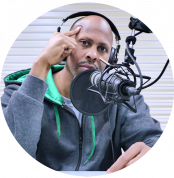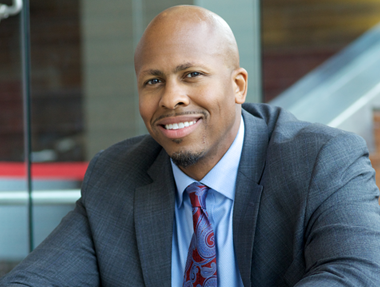OPEN TRANSCRIPT
ROB RICHARDSON
Welcome, everybody, to Disruption Now -- the Art and Equity Summit. With me is Damian Hoskins with Elementz. He is the general manager of that. He is going to tell you about what they do with hip-hop’s arts and culture.
And we’re also going to have a deeper conversation about what it means to have art and equity -- how to set yourself up, how to get yourself the right exposure, the right infrastructure, ownership and all that stuff -- and tell you a little bit about his journey and learn a little more. -- Damian, how are you doing?
DAMIAN HOSKINS
I’m good, Rob. How about yourself, man?
ROB
Hey, man. I’m doing well… doing well. I appreciate you coming on and I appreciate you being here and participating today.
Again, we’d love to take your comments. Let us know as you go along -- in the audience. Ask us some questions. We’ll make sure to answer it after we’re done talking here, wrapping it a little bit.
This segment is about navigating the creative economy. There are certainly a lot of opportunities in this economy. It’s been more democratized than it ever has been. It doesn’t mean things are nearly at the level of equity they need to be but there’s the opportunity to do that more than there ever has been and really want to talk to you about that.
DAMIAN
Sure.
ROB
You’re an artist. You work with artists a lot. You work with artists in hip-hop. You’ve had a lot of experience as an artist personally yourself. Walk me through what you would say to some aspiring artists that are working to figure out, “How do I make sure that I navigate the barriers appropriately within the creative economy”?
DAMIAN
First, it would start, I think, with being exposed to the various facets of the creative economy of whatever that art form is and the economic ecosystem that surround that art form.
Typically, when you’re talking about the people that we serve at Elementz and the people that have some affinity to -- the young black and brown people -- there’s an exposure deficit, right?
I taught school, Rob, for about 13 years. I taught middle school. The good thing about middle school kids is they’re not kids anymore but they’re sort of navigating this gray space. They’re like blank canvasses. You can inform them, empower them to see things differently and change the trajectory of their lives. But the vast majority of those kids wanted to be like one of five things. Very broadly, they want to be like doctors, lawyers, entertainers, athletes or a barber or a beautician -- somewhere around there.
ROB
Yeah.
DAMIAN
I’ve never had a kid say, “I want to be a culinary artist. I want to be a chef.” I’ve never had a kid say, “I want to be an architect. I want to be a graphic designer or web developer” -- you know what I mean -- “a set designer on a Broadway stage.” I’ve never had a kid from the inner city tell me that. And not because they wouldn’t be interested in it but because they don’t know it exists, right?
ROB
Right.
DAMIAN
So that’s really where the exposure part comes from. You get in a car and you got some place to go. If you don’t know how to get there, any road will take you there. You know what I mean?
ROB
And the narratives and the expectations you get are not there because the reasons why people have that -- doctors and engineers -- that’s… We need to have more of that narrative but at least they see that some.
DAMIAN
Exactly.
ROB
I saw this meme. It kind of put something in my brain just now. It said like, “Let’s start talking to over 6-ft. black men and not just say, “Oh are you an athlete? You should be an athlete. Are you sure you’re not an athlete?” Maybe like, “Oh are you a graphic artist? Are you an engineer,” right -- setting different narrative expectations.
DAMIAN
Exactly. That’s exactly right. And we have through language... I mean all of that can be codified. You can literally craft and empower a kid just by the things that you tell them, share with them, expose them to. And you can change how they view themselves which is really, really important.
So to go back to your question, as far upstream as we can go to address that. I’m talking like exposure as young as elementary school. You know, kids are always expressing themselves visually, creatively with colors and pictures and shapes because that’s how they communicate. At a certain point though, that stops and then we begin to focus on more sort of the technical aspects of learning.
I fall in this category. I’m a visual learner. I’m a painter, a graphic designer. Put me in a trigonometry class and I’m not going to be as successful unless I can draw whatever those equations are supposed to be or put some kind of graphic around it then it helps me to understand.
I think when we’re able to expose our kids to the vastness of the creative space then it opens up their minds to what’s possible and then you can move out of those just five things and move into something entirely different.
Every medical office, everybody in the health care industry, has a logo, a brand identity, that was created by somebody who is not a doctor. But you wouldn’t know about that health care organization without that creative thinking. You know what I mean?
ROB
Exactly.
DAMIAN
So to expand it to that… and that’s how you begin the navigation. But--
ROB
I think that’s such a great point. I mean when you think about… -- Sorry to interrupt you.
When you think about kids and how we are teaching, bringing the art visualization into the curriculum to make people understand like, “Look, you can make money off of your ideas and your creativity. A lot of people do it and this is how careers like this work” instead of just, “How do you take a test?”
I know we got to do those things but there’s a whole bunch of kids that will take a test well and then they’re being led to believe that they don’t have intelligence because they don’t do one thing well.
DAMIAN
That’s right. There’s a meme or a cartoon, “If you try to grade a fish on his ability to climb a tree, he’ll fail every time.”
ROB
Exactly right.
[END OF TRANSCRIPT]

HOSTED BY
ROB RICHARDSON
Share This!
I have never had a kid from the Inner city tell me that, not because they wouldn't be interested in it but because they don't know it exists. That is really where that exposure part comes from.
Damian Hoskins is the General Manager of Elementz an organization focused on providing hope and catalyzing change for the young people in the urban core through hip-hop culture.
CONNECT WITH THE HOST


ROB RICHARDSON
Entrepreneur & Keynote Speaker
Rob Richardson is the host of disruption Now Podcast and the owner of DN Media Agency, a full-service digital marketing and research company. He has appeared on MSNBC, America this Week, and is a weekly contributor to Roland Martin Unfiltered.
MORE WAYS TO WATCH

DISRUPTION NOW
Serious about change? Subscribe to our podcasts.







